The Electronic Intifada 2 May 2016

A Palestinian baby sits in a crib after the child’s family home was destroyed in the West Bank community of Khirbet Tana near Nablus on 7 April. Israel has demolished structures in the community four times in less than two months under the pretext that they were built without permits. Israel rarely gives building permits to Palestinians living in large swathes of the West Bank.
ActiveStillsIsraeli forces shot dead three Palestinians, one of them a child, during the month of April, and no Israelis were killed — a dramatic drop in the number of fatalities after months of increased violence.
Sixty Palestinians were killed by Israeli forces during the first three months of this year, and more than 140 in the last three months of 2015. Approximately 30 Israelis were killed during those six months.
More than 130 Palestinians have been killed since the beginning of October during what Israel says were attacks or attempted attacks on civilians and soldiers; dozens more Palestinians have been killed during protests.
Brother and sister killed
Israeli forces killed a pregnant young mother of two and her 16-year-old brother at a military checkpoint in the occupied West Bank on 27 April and denied emergency medics access to the siblings.
Israel claimed Maram Salih Hassan Abu Ismail and her brother Ibrahim Salih Hassan Taha were killed during an attempted attack on soldiers, but eyewitnesses disputed this version of events.
The siblings’ family said that Abu Ismail had obtained a permit to cross the Qalandiya checkpoint outside Ramallah to travel to Jerusalem for a medical appointment and didn’t understand the orders shouted at her by the soldiers in Hebrew.
On 1 May, Israel revealed that the fatal shots had been fired by a private security guard contracted by the Israeli defense ministry, and not by police, as initially reported.
“Since police weren’t the ones who fatally shot” the siblings, the Tel Aviv newspaper Haaretz reported, “no probe was opened by [the] justice ministry’s police investigation unit into the officers involved.”
It is unclear if there will be any investigation at all into the killings.
On 14 April, Israeli forces killed 50-year-old Ibrahim Baradiya from al-Arroub refugee camp near the West Bank city of Hebron after he allegedly attempted to hit a soldier in the head with an ax.
Another Palestinian, Abd al-Hamid Abu Srour, a 19-year-old from Aida refugee camp near the West Bank city of Bethlehem, died from wounds he sustained during an explosion on a Jerusalem bus.
Israel named Abu Srour as a suspect in the alleged bombing in which 20 Israelis were reported injured.
As of 27 April, Israel was withholding the bodies of 18 Palestinians killed during alleged attacks over the previous six months, according to the United Nations monitoring group OCHA.
Arrests and demolitions
During the month of April Israeli forces arrested dozens of Palestinians in Jerusalem in connection with protests against the entry of Israeli and settler groups into the al-Aqsa mosque compound in the Old City, according to OCHA.
Throughout the West Bank, Israeli forces demolished dozens of Palestinian-owned structures, displacing approximately 175 Palestinians, including nearly 100 children.
Israel also issued 30 stop work and demolition orders in the Silwan neighborhood of Jerusalem, putting 1,000 Palestinians living in 90 homes at risk of displacement.
A settler group is working with the Israeli government to seize Palestinian property in the area to convert them into settler homes and tourist facilities for a religious theme park.
A Palestinian home in the Jenin area was meanwhile converted into an Israeli military observation point, affecting three families of 25 members, including 19 children.
Suspected Israeli settlers hit three Palestinians, including two children, with their cars during the month.
A Palestinian was critically injured during one of the incidents, OCHA reported. A 64-year-old Palestinian bus driver was meanwhile assaulted and injured by a group of Israelis near the central bus station in West Jerusalem.
Israeli settlers marched towards the West Bank village of Duma reportedly in solidarity with a settler being prosecuted for a July 2015 attack on a home in the village which resulted in the killing of a Palestinian baby and his parents. Forty-five Palestinians were injured during the incident in which the army intervened.
Gaza under fire
Israeli forces opened fire in Gaza dozens of times during the month of April, including on fishermen, despite Israel’s reported expansion of the permitted fishing area along the Gaza coast. Israeli authorities meanwhile suspended the import of cement into Gaza for the private sector, claiming that supplies were being diverted to Hamas, further hindering reconstruction of thousands of homes destroyed during Israel’s 2014 assault.
The Egypt-controlled Rafah crossing — the sole point of exit and entry for the vast majority of Gaza’s 1.8 million residents — remained closed throughout the month. The crossing has been closed since late October 2014 with the exception of 42 days of partial openings.
Gaza authorities reported that more than 30,000 people, including approximately 9,500 medical cases, and 2,700 students are registered and waiting to travel through the crossing.
Palestinians in Yarmouk refugee camp near the Syrian capital of Damascus came under fire once more as fierce fighting between rival armed groups broke out in the camp, preventing the thousands of civilians who remain there from accessing food and water.
The United Nations’ special envoy to Syria stated in April that he estimated that 400,000 people had been killed during five years of civil war in the country.
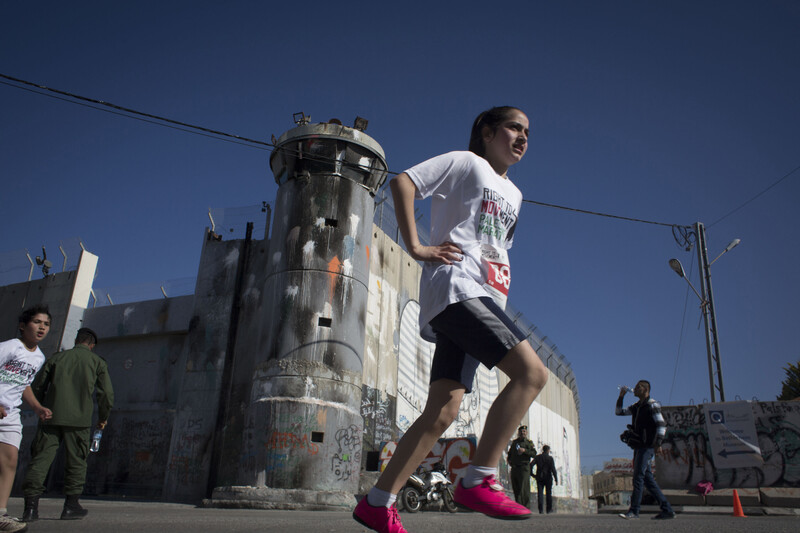
A girl runs past a section of Israel’s West Bank wall in Bethlehem during the Right to Movement Palestine Marathon on 1 April.
ActiveStills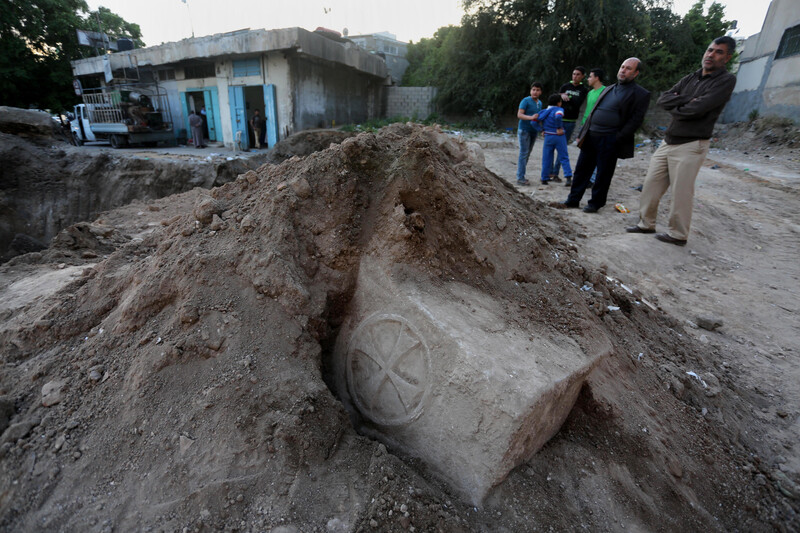
The ruins of a Byzantine-era church are unearthed by archaeologists in Gaza City, 2 April.
APA images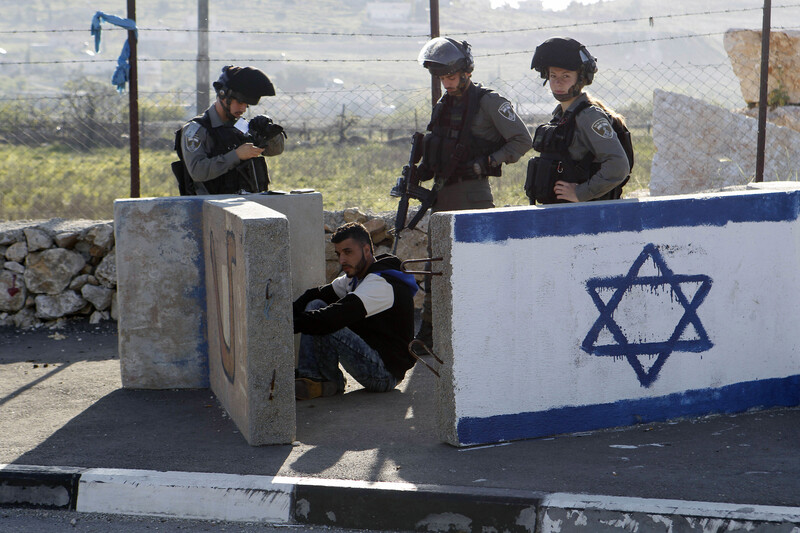
Israeli forces arrest a Palestinian man at the Beit Einoun junction near the West Bank city of Hebron on 4 April.
APA images
Palestinians take part in a weekly sit-in in front of the Red Cross offices in Gaza City demanding the release of loved ones in Israeli jails, 4 April.
APA images
Palestinians inspect the rubble of a home demolished by Israeli forces in the village of Qabatiya near the West Bank city of Jenin, 4 April. Israeli forces razed homes belonging to the families of three youths who were shot dead in February during an armed attack in Jerusalem in which an Israeli Border Police combatant was also killed.
APA images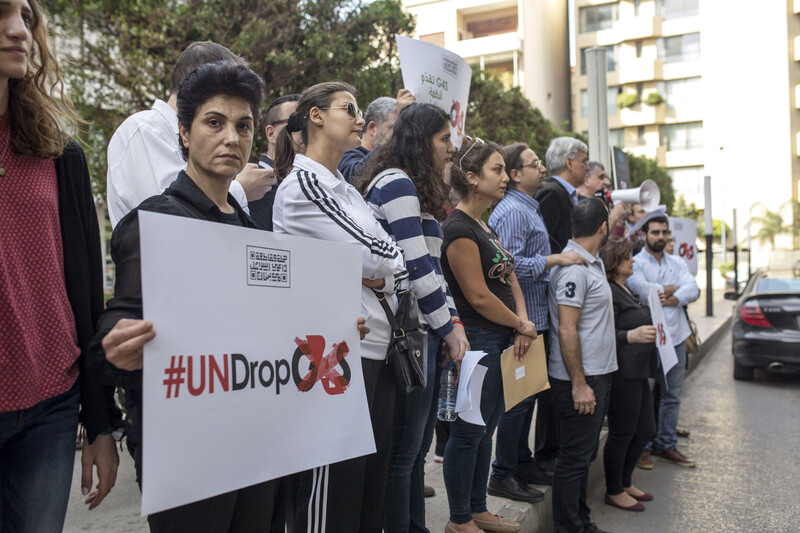
Boycott, divestment and sanctions activists protest in front of UNICEF’s offices in Beirut, Lebanon, calling on the United Nations children’s agency to end its contracts with the security company due to its involvement in Israeli abuses of Palestinian rights, 5 April.
ActiveStills
Palestinians rally during an 11 April demonstration in solidarity with Majd Oweida, an electrical engineer arrested by Israel in February while attempting to travel to the West Bank to recruit contestants for a televised talent show. Israel charged him with working with the armed wing of Islamic Jihad to intercept military drone feeds and hack signals from Israeli police cameras and collect flight information from Ben Gurion airport near Tel Aviv.

Palestinian women wash dishes outside a cave being used as shelter in the village of al-Mufaqarah, south of the West Bank city of Hebron, on 14 April. Al-Mufaqarah is among 12 communities located in an area declared as a “firing zone” by the Israeli military, and whose residents are prevented from building by Israel.
APA images
Palestinians observe a building housing a currency exchange in the center of the West Bank city of Ramallah after it was raided by Israeli forces, 14 April. An Israeli army spokesperson told the Ma’an News Agency that forces raided the currency exchange to confiscate “terror funds.” When the owner of the company refused to open the business’ safe, Israeli forces attempted to explode it open, igniting a fire.
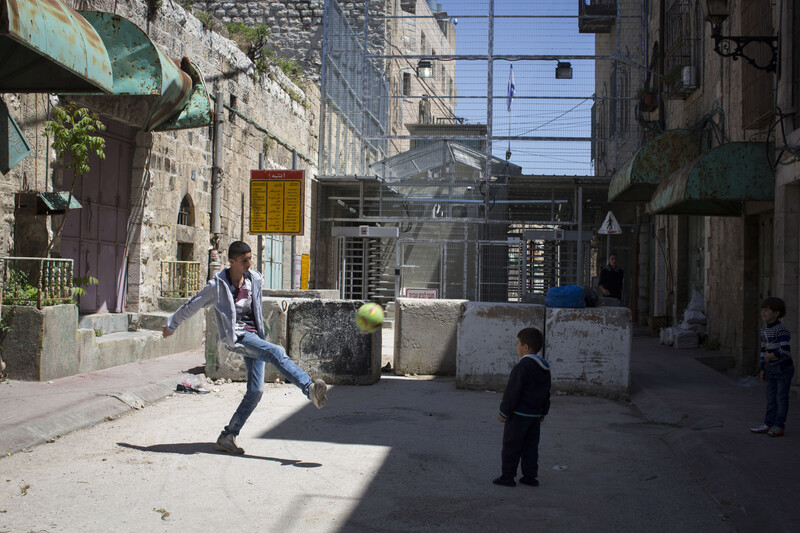
Palestinian children play next to an Israeli military checkpoint leading to Shuhada Street, the former commercial strip in the West Bank city of Hebron which has been closed by Israel for more than 20 years, 15 April.
ActiveStills
Mourners carry the body of Ibrahim Baradiya, shot dead after allegedly attacking an Israeli soldier with an ax, during his funeral on 16 April at al-Arroub refugee camp near the West Bank city of Hebron.
APA images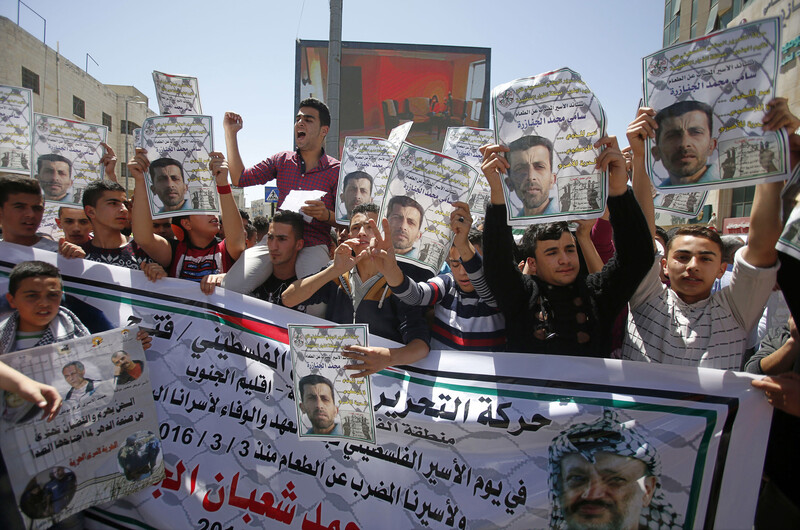
Palestinians hold posters of hunger-striking prisoner Sami Janazrah during a demonstration marking Palestinian Prisoners Day in the West Bank city of Hebron on 17 April. Janazrah began refusing food in early March to protest his detention without charge or trial by Israel.
APA images
Israeli authorities search the remains of a burnt-out bus after an explosion in Jerusalem in which the alleged bomber, a 19-year-old from a Bethlehem-area refugee camp, incurred fatal wounds and 20 Israelis were injured on 18 April.
EPA
Palestinian emergency personnel take part in 19 April drill in a Gaza City building destroyed during Israel’s onslaught in the summer of 2014.
APA images
Israelis rally in Tel Aviv on 19 April in support of a soldier charged with manslaughter after being shown on video executing a wounded Palestinian in the West Bank city of Hebron in late March.
ActiveStills
Palestinians inspect the house of Hussein Abu Ghosh after it was badly damaged by Israeli forces in Qalandiya refugee camp near the West Bank city of Ramallah on 20 April. Abu Ghosh, 17, was shot dead after he and another youth allegedly stabbed two women in an Israeli settlement in January. A family of eight, including five children, were displaced as a result of the revenge demolition, according to the United Nations monitoring group OCHA.
APA images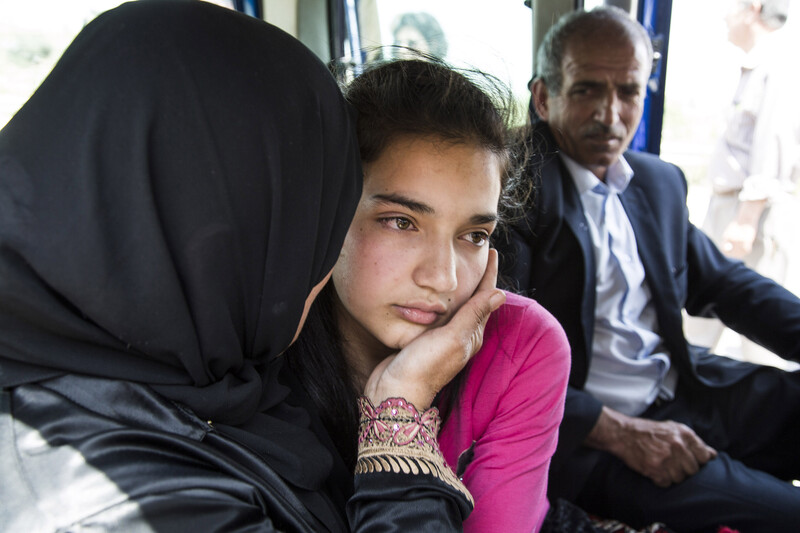
Dima al-Wawi, 12, is received by her family at a West Bank checkpoint following her release from Israeli prison on 24 April. Dima was arrested in February after allegedly approaching an Israeli settlement while carrying a knife.
ActiveStills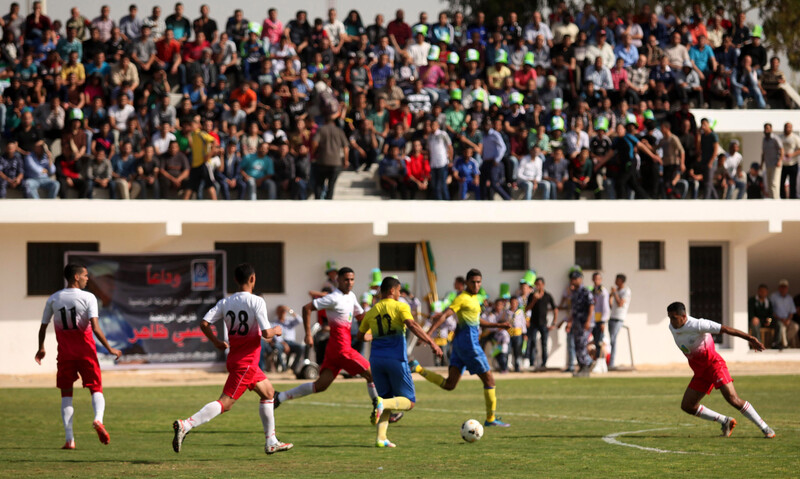
The Shabab Jabaliya club and Shabab Khan Younis football teams compete during the final match of the Gaza Cup at Yarmouk stadium in Gaza City, 24 April.
APA images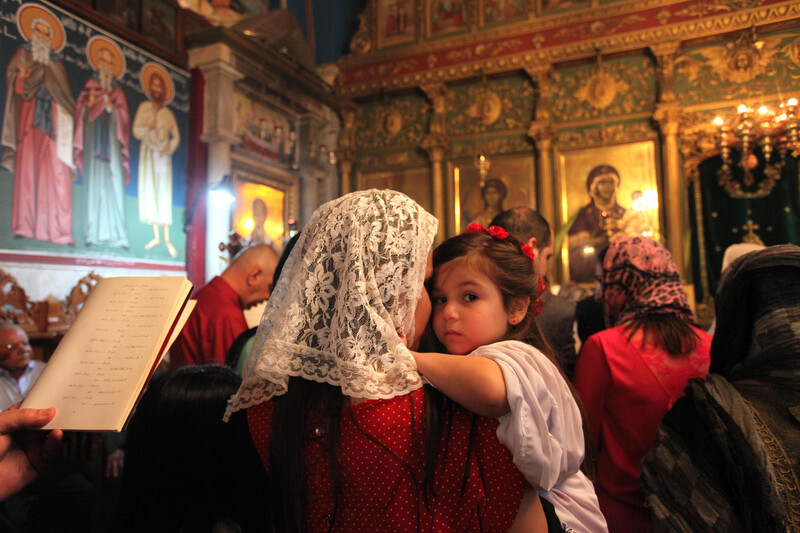
Worshippers observe Eastern Orthodox Palm Sunday at the Church of Saint Porphyrius in Gaza City on 24 April.
APA images
Palestinians harvest wheat at a farm in Khan Younis, southern Gaza Strip, on 25 April.
APA images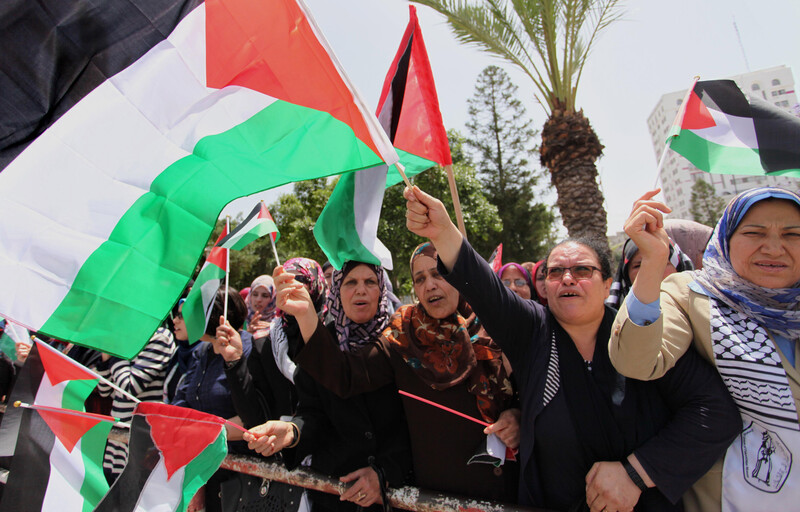
Palestinian women in Gaza City wave flags during a demonstration calling for an end to intra-Palestinian political division and for national reconciliation on 26 April.
APA images
Israeli troops escort Jewish settlers during a tour of the West Bank city of Hebron on the Passover holiday, 26 April.
APA images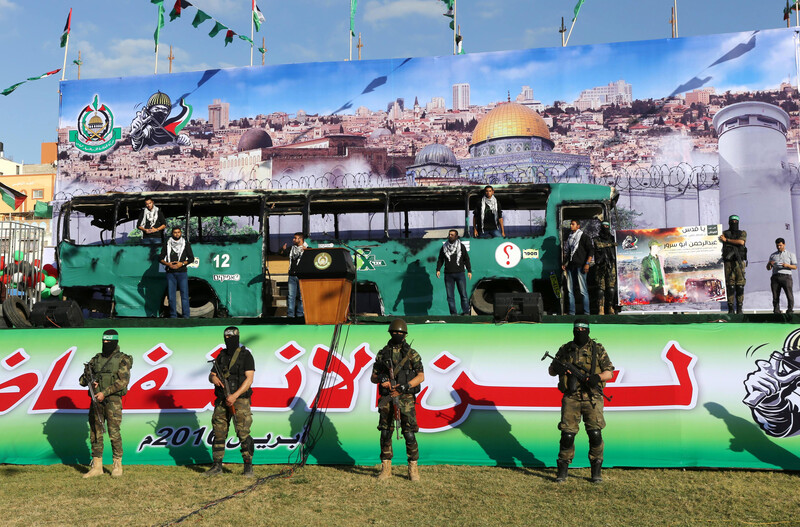
Fighters with Hamas’ Qassam Brigades rally in front of a mock burnt Israeli bus in Gaza City on 28 April.
APA images

